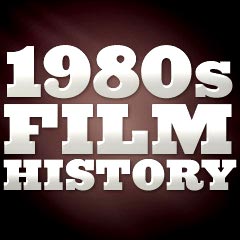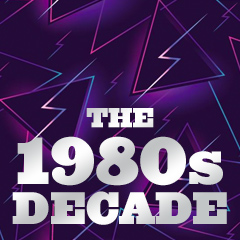|
Traditional Films and Modern-Day Dramas:
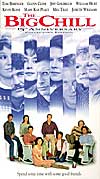 Some
of the films of the era seemed traditional and conservative reflecting
the times, rather than being radical and innovative. Writer/director
Lawrence Kasdan's landmark "coming-of-middle-age" film The
Big Chill (1983), chronicled
the reunion of a group of eight friends (ex-college radicals) during a
funeral for friend Alex (Kevin Costner as the corpse - unseen and edited
out of the film). They comprised a "Big Chill generation" who
grew up in the 60s (Kevin Kline, Tom Berenger, William Hurt, Glenn
Close, Jeff Goldblum, Jo-beth Williams, Mary Kay Place, and Meg Tilly).
Kasdan's film marked the aging of the 'baby-boomer' generation (now
growing into yuppies). Some
of the films of the era seemed traditional and conservative reflecting
the times, rather than being radical and innovative. Writer/director
Lawrence Kasdan's landmark "coming-of-middle-age" film The
Big Chill (1983), chronicled
the reunion of a group of eight friends (ex-college radicals) during a
funeral for friend Alex (Kevin Costner as the corpse - unseen and edited
out of the film). They comprised a "Big Chill generation" who
grew up in the 60s (Kevin Kline, Tom Berenger, William Hurt, Glenn
Close, Jeff Goldblum, Jo-beth Williams, Mary Kay Place, and Meg Tilly).
Kasdan's film marked the aging of the 'baby-boomer' generation (now
growing into yuppies).
Romance was back in fashion in Norman Jewison's Italian-American romance/comedy
Moonstruck (1987) with a widowed Loretta (Best Actress-winning
Cher) finding love with the baker brother (Nicolas Cage) of her fiancee.
Barry Levinson's entertaining, old-fashioned The Natural (1984)
about a gifted baseball player, and Phil Alden Robinson's idealistically-uplifting
fantasy classic Field of Dreams (1989)
- also about baseball - with one of Kevin Costner's finest roles, reminded
one of Frank Capra's films.
 On Golden Pond (1981) (the first film that starred both Jane and
father Henry Fonda and the first film pairing of Henry Fonda and Katharine
Hepburn) earned two major Academy Awards - it was Hepburn's fourth Oscar
award (a record) and ailing Henry Fonda's first, shortly before his death.
The film was about a visit of estranged daughter Chelsea (Jane Fonda)
with her aging parents. Director Ron Howard's sci-fi fantasy Cocoon
(1985) told of a group of seniors in a Florida retirement home who
were rejuvenated by an alien treatment in a "fountain of youth." Jessica
Tandy starred as aging Jewish widow Mrs. Wertham with a tolerant black
chauffeur (Morgan Freeman) in the South in Bruce Beresford's Driving
Miss Daisy (1989), notable for winning both Best Picture and Best
Actress.
On Golden Pond (1981) (the first film that starred both Jane and
father Henry Fonda and the first film pairing of Henry Fonda and Katharine
Hepburn) earned two major Academy Awards - it was Hepburn's fourth Oscar
award (a record) and ailing Henry Fonda's first, shortly before his death.
The film was about a visit of estranged daughter Chelsea (Jane Fonda)
with her aging parents. Director Ron Howard's sci-fi fantasy Cocoon
(1985) told of a group of seniors in a Florida retirement home who
were rejuvenated by an alien treatment in a "fountain of youth." Jessica
Tandy starred as aging Jewish widow Mrs. Wertham with a tolerant black
chauffeur (Morgan Freeman) in the South in Bruce Beresford's Driving
Miss Daisy (1989), notable for winning both Best Picture and Best
Actress.
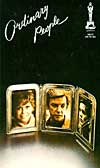 Actor
Robert Redford directed his first (and best) film in an auspicious debut,
the powerfully-human drama (with Mary Tyler Moore, Donald Sutherland and
Timothy Hutton) about a dysfunctional, mis-communicating suburban Chicago
WASP family after the death of a young son, Ordinary People (1980)
- a film that won Best Director, Best Supporting Actor and Best Picture
Academy Awards, among others. Alan Alda marked his directorial debut with
The Four Seasons (1981), a story about marriage and friendship
between three middle-aged couples who always went on vacation during different
seasons. Australian film-maker Peter Weir directed Robin Williams as an
unorthodox prep school English teacher who urged his students to 'seize
the day' in Dead Poets Society (1989). Actor
Robert Redford directed his first (and best) film in an auspicious debut,
the powerfully-human drama (with Mary Tyler Moore, Donald Sutherland and
Timothy Hutton) about a dysfunctional, mis-communicating suburban Chicago
WASP family after the death of a young son, Ordinary People (1980)
- a film that won Best Director, Best Supporting Actor and Best Picture
Academy Awards, among others. Alan Alda marked his directorial debut with
The Four Seasons (1981), a story about marriage and friendship
between three middle-aged couples who always went on vacation during different
seasons. Australian film-maker Peter Weir directed Robin Williams as an
unorthodox prep school English teacher who urged his students to 'seize
the day' in Dead Poets Society (1989).
 An
Officer and a Gentleman (1982) was a traditional romantic drama about
the son of a career sailor (Richard Gere) who attempted to better himself
by training at Naval Aviation Officer Candidate School, and who was eventually
lifted up by love with townie Debra Winger. Barry Levinson directed the
award-winning, road-trip drama Rain Man (1988) with Dustin Hoffman
as autistic idiot savant Raymond - the older brother of self-centered,
manipulative hustler Charlie (Tom Cruise), who were reunited together
after their father's death. Writer/producer James Brooks also directed
Broadcast News (1987) - a behind-the-scenes look at contemporary
TV journalism and journalistic integrity through three characters: a dumb
but handsome newscaster (William Hurt), smart but awkward newswriter and
reporter (Albert Brooks), and over-achieving, high-strung network news
producer (Holly Hunter) - all of whom, plus the director (for Best Picture
and Best Original Screenplay), received Academy Award nominations. An
Officer and a Gentleman (1982) was a traditional romantic drama about
the son of a career sailor (Richard Gere) who attempted to better himself
by training at Naval Aviation Officer Candidate School, and who was eventually
lifted up by love with townie Debra Winger. Barry Levinson directed the
award-winning, road-trip drama Rain Man (1988) with Dustin Hoffman
as autistic idiot savant Raymond - the older brother of self-centered,
manipulative hustler Charlie (Tom Cruise), who were reunited together
after their father's death. Writer/producer James Brooks also directed
Broadcast News (1987) - a behind-the-scenes look at contemporary
TV journalism and journalistic integrity through three characters: a dumb
but handsome newscaster (William Hurt), smart but awkward newswriter and
reporter (Albert Brooks), and over-achieving, high-strung network news
producer (Holly Hunter) - all of whom, plus the director (for Best Picture
and Best Original Screenplay), received Academy Award nominations.
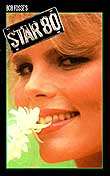 Jodie
Foster won her first Best Actress Oscar for her honest portrait of real
life gang-rape victim Sarah Tobias, who was represented by lawyer Kelly
McGillis in Jonathan Kaplan's provocative, uncompromising courtroom drama
The Accused (1988). And William Hurt won a Best Actor Oscar (his
first) as a homosexual South American prison inmate in Argentine director
Hector Babenco's Kiss of the Spider Woman (1985). Jessica Lange
gave an incredible performance in Graeme Clifford's Frances (1982)
as the doomed, self-destructive 30s actress Frances Farmer. So did Mariel
Hemingway as upcoming starlet Dorothy Stratten - the tragically-innocent
Playboy centerfold (August, 1979) and newly-named 1980 Playboy
Playmate of the Year, who was brutally murdered in mid-August 1980, in
legendary director - actor - choreographer Bob Fosse's last film Star
80 (1983). Prizzi's Honor (1985) starred Kathleen Turner as
a hired killer and Jack Nicholson as a Mafia hitman - star-crossed professionals
who got married and then had to kill each other. Jodie
Foster won her first Best Actress Oscar for her honest portrait of real
life gang-rape victim Sarah Tobias, who was represented by lawyer Kelly
McGillis in Jonathan Kaplan's provocative, uncompromising courtroom drama
The Accused (1988). And William Hurt won a Best Actor Oscar (his
first) as a homosexual South American prison inmate in Argentine director
Hector Babenco's Kiss of the Spider Woman (1985). Jessica Lange
gave an incredible performance in Graeme Clifford's Frances (1982)
as the doomed, self-destructive 30s actress Frances Farmer. So did Mariel
Hemingway as upcoming starlet Dorothy Stratten - the tragically-innocent
Playboy centerfold (August, 1979) and newly-named 1980 Playboy
Playmate of the Year, who was brutally murdered in mid-August 1980, in
legendary director - actor - choreographer Bob Fosse's last film Star
80 (1983). Prizzi's Honor (1985) starred Kathleen Turner as
a hired killer and Jack Nicholson as a Mafia hitman - star-crossed professionals
who got married and then had to kill each other.
David Lynch directed the melancholy The Elephant Man
(1980) about Victorian England's John Merrick - a grotesquely-deformed
and alienated man (John Hurt) afflicted by a disease ("I am not an
animal") that was treated by doctor Anthony Hopkins. Edgar Rice Burrough's
most famous novel was revisited in Greystoke: The Legend of Tarzan,
Lord of the Apes (1984), starring Christopher Lambert as the title
character raised by apes in 1880s Africa. Oscar-less Harrison Ford received
a rare nomination for his performance in Peter Weir's crime drama Witness
(1985) as John Book - a cop in hiding in Amish country while assisting
a young boy who witnessed a murder in a train station restroom.
80s Melodramas and 'Chick Flick' Tearjerkers:
The decade was also characterized by 'weepies' - highly-emotional, treacle-soaked
films with strong content that appealed to female audiences, and often
revolved around terminal illness. One of the most successful examples
was director/writer James Brooks' first feature film - the bittersweet,
Best Picture-winning melodrama Terms of Endearment
(1983), based on the novel by Larry McMurtry. The multiple Oscar-wining
film told about three decades in the troubled lives of widowed mother
Aurora Greenaway (Shirley MacLaine) and her daughter Emma (Debra Winger),
ending with a teary hospital sequence. It also starred Jack Nicholson
as ex-astronaut and Aurora's next-door neighbor Garrett Breedlove engaged
in a torrid affair with her. [It was followed by the sequel The Evening
Star (1996) with Shirley MacLaine and Jack Nicholson reprising their
roles.] Others included:
- Garry Marshall's hit Beaches (1988), with Bette
Midler and Barbara Hershey as lifelong friends and jealous rivals, as
well as polarized opposites: free-spirited CC Bloom (Midler) - a flamboyant,
vivacious theatre actress and singer from a poor Jewish Brooklyn background,
and Hillary Essex (Hershey) - a repressed WASP debutante and San Francisco
lawyer; highlights included Midler's performances of "Otto Titsling"
and the hit "Wind Beneath My Wings." (Not long after, Midler
would appear in another quintessential melodrama by director Mark Rydell
titled For the Boys (1991), that allowed her to show off her
vocal talents in an Oscar-nominated role as Dixie Leonard - a WWII 'Martha
Raye-type' entertainer, co-starring James Caan)
- click-flick director Herbert Ross' most successful
film, a Louisiana-based melodrama based on Robert Harling's stage play,
Steel Magnolias (1989), with Truvy's Beauty Parlor in Louisiana
as the film's setting; it featured a star-studded cast of gossipy Southern
belles: Dolly Parton (as Truvy), customers Sally Field and Shirley MacLaine,
the afflicted Julia Roberts (the film's sole Oscar nominee),
Daryl Hannah and Olympia Dukakis, and a few minor male characters
- Mike Nichols' Postcards From the Edge (1990),
based on Carrie Fisher's semi-autobiographical best-selling novel about
drug addiction and love/hate mother-daughter rivalry (between herself
and mother Debbie Reynolds), starring Meryl Streep and Shirley MacLaine
- Fried Green Tomatoes (1991),
based on the novel Fried Green Tomatoes at the Whistle Stop Cafe
by actress-turned-author Fannie Flagg, about the lives of four women,
with Kathy Bates, Jessica Tandy, Mary Stuart Masterson, and Mary-Louise
Parker
Woody Allen:
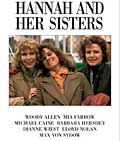 Excellent,
low-budget, character-driven films were made, in spite of Hollywood's
morbid interest in moneymakers or sequels, including Woody Allen's semi-autobiographical
Stardust Memories (1980), his version of Shakespeare's A Midsummer
Night's Sex Comedy (1982) that was loosely based on Ingmar Bergman's
Smiles of a Summer Night (1955), Zelig (1983) (with the
pioneering sleight-of-hand technique of seamlessly wedding historical,
black and white newsreel footage with the live-action sequences - something
imitated years later in Robert Zemeckis' Forrest Gump (1994)),
a send-up of gangster films and screwball comedies with Broadway Danny
Rose (1984), The Purple Rose of Cairo (1985), and then two
of Allen's best films since Annie Hall (1977): Excellent,
low-budget, character-driven films were made, in spite of Hollywood's
morbid interest in moneymakers or sequels, including Woody Allen's semi-autobiographical
Stardust Memories (1980), his version of Shakespeare's A Midsummer
Night's Sex Comedy (1982) that was loosely based on Ingmar Bergman's
Smiles of a Summer Night (1955), Zelig (1983) (with the
pioneering sleight-of-hand technique of seamlessly wedding historical,
black and white newsreel footage with the live-action sequences - something
imitated years later in Robert Zemeckis' Forrest Gump (1994)),
a send-up of gangster films and screwball comedies with Broadway Danny
Rose (1984), The Purple Rose of Cairo (1985), and then two
of Allen's best films since Annie Hall (1977):
- Hannah and Her Sisters (1986), an adult drama
about relationships among Manhattanite sisters (Mia Farrow as Hannah,
Barbara Hershey as Lee, and Dianne Wiest as Holly) - Allen's most
financially-successful film
- Crimes and Misdemeanors (1989), a treatise on
trust and guilt
In-between these films were his nostalgic, WWII-era comedy
Radio Days (1987), inspired by Fellini's Amarcord (1973),
(with Original Screenplay and Art Direction nominations), and two dramas:
September (1987) and an Ingmar Bergman homage titled Another
Woman (1988). In the 80s, Allen also directed one of the segments
("Oedipus Wrecks") in the 3-part anthology of New York Stories
(1989), co-directed by Francis Ford Coppola and Martin Scorsese.
Martin Scorsese's Films:
 Raging
Bull (1980) was voted by American film critics at the end of the
era as the best film of the decade and an abrupt turn-about from the triumphant
Rocky (1976) of a few years earlier. Robert
De Niro gained a record amount of weight (about 60 pounds) in order to accurately portray the
beleaguered, machismo middle-weight boxer Jake LaMotta who had to battle
'Sugar Ray' Robinson and his brother Joey (Joe Pesci). Scorsese's The
Last Temptation of Christ (1988) (from screenwriter Paul Schrader
who had adapted Nikos Kazantzakis' novel and had provided scripts for
other Scorsese films - Taxi Driver (1976)
and Raging Bull (1980)) was controversial
and considered blasphemous by fundamentalists for its human portrayal
of the Christ figure (played by Willem Dafoe). The violence of vigilante
cab driver Travis Bickle in Scorsese's Taxi Driver (1976) was echoed
in the shooting of President Reagan by a Jodie Foster-obsessed John Hinckley,
Jr. in late March, 1981. Raging
Bull (1980) was voted by American film critics at the end of the
era as the best film of the decade and an abrupt turn-about from the triumphant
Rocky (1976) of a few years earlier. Robert
De Niro gained a record amount of weight (about 60 pounds) in order to accurately portray the
beleaguered, machismo middle-weight boxer Jake LaMotta who had to battle
'Sugar Ray' Robinson and his brother Joey (Joe Pesci). Scorsese's The
Last Temptation of Christ (1988) (from screenwriter Paul Schrader
who had adapted Nikos Kazantzakis' novel and had provided scripts for
other Scorsese films - Taxi Driver (1976)
and Raging Bull (1980)) was controversial
and considered blasphemous by fundamentalists for its human portrayal
of the Christ figure (played by Willem Dafoe). The violence of vigilante
cab driver Travis Bickle in Scorsese's Taxi Driver (1976) was echoed
in the shooting of President Reagan by a Jodie Foster-obsessed John Hinckley,
Jr. in late March, 1981.
Science-Fiction Films:
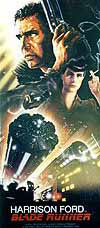 The
cult science-fiction classic from Ridley Scott, the futuristic, visually-bleak, film-noirish
Blade Runner (1982) with a Vangelis soundtrack,
set in a squalid 2019 Los Angeles (in an amazing opening sequence viewing the cityscape), was based on Philip K. Dick's novel
Do Androids Dream of Electric Sleep?. It unexpectedly grew in stature, popularity
and acclaim over time as the decade advanced, but was originally pulled from theatres after an unsuccessful opening. Controversy arose over the voice-over
of star Harrison Ford as the downbeat, called-out-of-retirement blade-runner Rick Deckard, and over the studio-appended 'happy' ending - both
of which were excised in the Director's Cut released in 1991, that also restored a unicorn dream sequence. The
cult science-fiction classic from Ridley Scott, the futuristic, visually-bleak, film-noirish
Blade Runner (1982) with a Vangelis soundtrack,
set in a squalid 2019 Los Angeles (in an amazing opening sequence viewing the cityscape), was based on Philip K. Dick's novel
Do Androids Dream of Electric Sleep?. It unexpectedly grew in stature, popularity
and acclaim over time as the decade advanced, but was originally pulled from theatres after an unsuccessful opening. Controversy arose over the voice-over
of star Harrison Ford as the downbeat, called-out-of-retirement blade-runner Rick Deckard, and over the studio-appended 'happy' ending - both
of which were excised in the Director's Cut released in 1991, that also restored a unicorn dream sequence.
Alex Cox's
quirky and bizarre Repo Man (1983) delivered an unpredictable story
about the repossession racket with a sci-fi twist. And Ken Russell's American-produced, suspenseful sci-fi
thriller Altered States (1981), adapted by Paddy Chayefsky from
his own book of the same name, was about the de-evolutionary, hallucinatory
effects of mind-altering drugs and experiments on sensory deprivation
in an isolation tank by a daring psychologist (William Hurt in a debut
feature role) - noted most for its depiction of a psychedelic, hallucinatory
experience and the exploration of the far reaches of the psyche.
John Carpenter's modern-day The Thing (1982) was set at the South Pole in an Antarctic research station that was threatened by a shape-shifting alien "thing" (with great special effects) -- it was a remake of uncredited director Howard Hawks' The Thing From Another World (1951), set at the North Pole. Paul
Verhoeven's breakthrough film, Robocop (1987), starred Peter Weller
as a police officer of the future after being killed in action in crime-ridden
Detroit and being brought back by cyborg technology.
In addition to Spielberg's E.T.:
The Extra-Terrestrial (1982) and Robert Zemeckis' Back to the
Future films, the computerized visual effects of Lucas' Industrial
Light and Magic dazzled in James Cameron's underwater alien adventure
epic The Abyss (1989) - the spectacular 'sea tentacle' morphing
effects would later be used to greater effect in Cameron's own megahit
Terminator 2: Judgment Day (1991).
Films with Revolutionary Visual Effects and Set Design:
in 1982
See this site's extensive section on Visual
and Special Effects Film Milestones -- Seven films revolutionized
film set design and visual effects, and have become some of the most influential
films in recent film history (mostly within the science-fiction
film genre):
- TRON (1982) - a pioneering film in computer
graphics
- Blade Runner (1982)
- the model for all futuristic tech-noir dystopias with bleak, night-time
cityscapes (i.e., Batman (1989), Strange Days (1995),
Dark City (1998))
- The Dark Crystal (1982) - an influential fantasy
adventure masterpiece featuring Jim Henson's Muppets
- E.T.: The Extra-Terrestrial
(1982) - Spielberg's classic alien visitation film
- Pink Floyd the Wall (1982)
- an expressionistic musical, the first feature-length music video (or
"MTV" film before MTV's popularity surged)
- The Road Warrior (1982, US release) - the prototypical,
post-apocalyptic action film and sci-fi western set in Australia, and
starring Mel Gibson
- Poltergeist (1982) -
a seminal supernatural thriller with a possessed young child
The Resurgent Wave of British Cinema:
Hugh Hudson's dark horse Best Picture winner Chariots
of Fire (1981) opened the decade with slow-motion footraces under the credits and a Vangelis
piano score. It starred Ben Cross as a Jewish athlete and Ian Charleson
as a Christian Scottish athlete who competed in the 1924 Paris Olympics.
During the victory speech of the film's Best Original Screenplay-winning
writer, Colin Welland proclaimed "The British are coming!" The British film
was victorious over Warren Beatty's three hour Communism epic Reds (1981)
(with twelve Oscar nominations - four of which were for Beatty as producer,
director, co-writer, and star, and with three wins), the story of the dawn of communist society
told by American writer John Reed (Beatty) in 'Ten Days That Shook the World'.
The romantic comedy Educating Rita (1983), starring Michael Caine
as a cynical English literature lecturer and Julie Walters as one of his
older working-class students, used Britain's Open University as its backdrop.
In My Left Foot (1989), Daniel Day-Lewis won an Oscar for his portrayal
of Irish writer/artist Christy Brown who suffered from cerebral palsy.
 The following year, British director Richard Attenborough's epic Gandhi
(1982), with Ben Kingsley in the title role as the 20th century pacifist
leader, also succeeded by taking top honors (eight Academy Awards).
Director John MacKenzie's modern-day crime film The Long Good Friday
(1980) presented the threatened empire of London gangster Harold Shand
(Bob Hoskins) over a "Good Friday" weekend. John Boorman's Excalibur
(1981) resurrected the magic of the Arthurian legend. Scotland was
the setting for the sword and sorcery fantasy epic Highlander (1986),
starring Christopher Lambert as the great immortal Clansman who could
die only by decapitation.
The following year, British director Richard Attenborough's epic Gandhi
(1982), with Ben Kingsley in the title role as the 20th century pacifist
leader, also succeeded by taking top honors (eight Academy Awards).
Director John MacKenzie's modern-day crime film The Long Good Friday
(1980) presented the threatened empire of London gangster Harold Shand
(Bob Hoskins) over a "Good Friday" weekend. John Boorman's Excalibur
(1981) resurrected the magic of the Arthurian legend. Scotland was
the setting for the sword and sorcery fantasy epic Highlander (1986),
starring Christopher Lambert as the great immortal Clansman who could
die only by decapitation.
British director David Lean returned to the screen after an absence of
fourteen years with his last film, the ponderous A Passage to India
(1984) based on E.M. Forster's 1924 novel. There was further controversy
over the British 'invasion' when British producer David Puttnam was made
the head of Columbia Pictures in 1986 - his reign was short-lived and
lasted only one year. One of the best British films of the decade was
writer/director Bruce Robinson's popular character drama/comedy titled
Withnail & I (1987) about two destitute, boozing and unemployable
actors: eccentric Withnail (Richard E. Grant) and the younger Marwood
(Paul McGann), who reside for the weekend in the British countryside circa
1969 with Withnail's wealthy, corpulent, homosexual "Uncle Monty"
(Richard Griffiths).
Idiosyncratic and experimental film-maker and writer Derek
Jarman, considered one of the British "enfants terribles", made
his first real mark with Caravaggio (1986), an intentionally-anachronistic
and avante-garde portrait of the influential late-Renaissance painter
Michelangelo Caravaggio (1573-1610) as a bi-sexual involved in a messy
love triangle. Controversial Peter Greenaway's first feature film debut
was the critically-acclaimed, deliberately-told, and elegantly-erotic
The Draughtsman's Contract (1983), later followed by the X-rated,
deliberately shocking and uncompromising black comedy The Cook, the
Thief, His Wife & Her Lover (1989).
Director Stephen Frears (with a script by Hanif Kureishi)
launched his diverse film career with My Beautiful Laundrette (1985),
set in the multi-racial world of young London and starring Daniel Day-Lewis.
Roland Joffe's The Killing Fields (1984),
an indictment of the war through an account of the Communist Khymer Rouge
faction's brutal devastation of Cambodia after the fall of Pnomh Penh
in 1975, explored the end of American involvement in SE Asia.
Neil Jordan's films in the 80s were a foretaste of what
was to come in the next decade (i.e., The Crying Game (1992), Interview
with the Vampire: The Vampire Chronicles (1994), Michael Collins (1996),
and The End of the Affair (1999)), with the following:
- Angel (1982) - Jordan's
debut film, set in Northern Ireland, a character study of a vengeful
saxophonist who witnessed the murder of a young mute girl
- The Company of Wolves (1984)
- featuring strange, cautionary Freudian 'wolf' folktales (such as Red
Riding Hood) told by grandmother Angela Lansbury to her granddaughter
Sarah Patterson
- Mona Lisa (1986) - with Bob Hoskins as a small-time
ex-con in the London underworld working as a chauffeur to prostitute
Simone (Cathy Tyson); dialogue with rich Cockney accents
- High Spirits (1988) -
a comedy/horror film with actors Peter O'Toole, Liam Neeson, Daryl
Hannah and Steve Guttenberg
- We're No Angels (1989) - a remake of the 1955
mistaken-identity and 'fish-out-of-water' comedy, which starred Humphrey
Bogart and Peter Ustinov, now with Robert De Niro and Sean Penn as escaped
fugitive convicts who disguise themselves as two long-lost Catholic
priests in a small-town church
Merchant-Ivory Films and Other British/Foreign Productions:
 The
Merchant-Ivory team of American-born director James Ivory, Indian-born
producer Ismail Merchant, and screenwriter Ruth Prawer-Jhabvala generated
sophisticated, nostalgic, intelligent, and lush costume dramas beginning
in the mid-80s: The
Merchant-Ivory team of American-born director James Ivory, Indian-born
producer Ismail Merchant, and screenwriter Ruth Prawer-Jhabvala generated
sophisticated, nostalgic, intelligent, and lush costume dramas beginning
in the mid-80s:
- a luminous and engaging E.M. Forster adaptation titled
A Room With a View (1985), a delightful comedy of errors tale
and social satire of repressed Victorian romance and British conceit,
that took
multiple Oscar nominations and starred china-faced beauty Helena Bonham
Carter and Daniel Day-Lewis in a story that began in Florence, Italy
and returned to England - with a short epilogue back in Italy
- Maurice (1987)
- Howard's End (1991)
- The Remains of the Day (1993)
 Following
the imaginative, Monty Pythonesque Time Bandits (1981), Terry Gilliam
also directed the Orwellian Brazil (1985)
- about futuristic life in an oppressive bureaucracy and the valiant attempts
of a mild-mannered worker to rectify the bleak system. He also mixed fantasy
and special effects in The Adventures of Baron Munchausen (1988).
And the off-beat, witty hit comedy A Fish Called Wanda (1988),
funded by MGM, was cleverly scripted by British star John Cleese (from
Monty Python), directed by Ealing Studios veteran Charles Crichton, and
featured stars (Kevin Kline, John Cleese, Jamie Lee Curtis) from both
sides of the Atlantic. It was a tale of a gang of scheming diamond thieves
who ended up accidentally flattening Yorkshire terriers. Following
the imaginative, Monty Pythonesque Time Bandits (1981), Terry Gilliam
also directed the Orwellian Brazil (1985)
- about futuristic life in an oppressive bureaucracy and the valiant attempts
of a mild-mannered worker to rectify the bleak system. He also mixed fantasy
and special effects in The Adventures of Baron Munchausen (1988).
And the off-beat, witty hit comedy A Fish Called Wanda (1988),
funded by MGM, was cleverly scripted by British star John Cleese (from
Monty Python), directed by Ealing Studios veteran Charles Crichton, and
featured stars (Kevin Kline, John Cleese, Jamie Lee Curtis) from both
sides of the Atlantic. It was a tale of a gang of scheming diamond thieves
who ended up accidentally flattening Yorkshire terriers.
 The
biggest international box-office hit of 1986 was Australia's surprise
'sleeper' comedy film "Crocodile" Dundee (1986) with Paul Hogan
(known to American viewers as a spokesman for Austrialian tourism commercials)
as the scriptwriter and in the title role as the rugged outback adventurer
- at home in Bush Country and able to survive in the alien streets of
New York with transvestites and street gangs. The film was the first
foreign film that had the biggest annual US box-office gross to date. The
biggest international box-office hit of 1986 was Australia's surprise
'sleeper' comedy film "Crocodile" Dundee (1986) with Paul Hogan
(known to American viewers as a spokesman for Austrialian tourism commercials)
as the scriptwriter and in the title role as the rugged outback adventurer
- at home in Bush Country and able to survive in the alien streets of
New York with transvestites and street gangs. The film was the first
foreign film that had the biggest annual US box-office gross to date.
Screen Biographies and Fact-Based Films:
 The
biopic made a comeback in films such as Coal Miner's Daughter (1980),
with Best Actress-winning Sissy Spacek as the rags-to-riches country
singer superstar Loretta Lynn who made it from Kentucky to Nashville,
Mike Nichols'
Silkwood (1984) - a fact-based story about 28-year old Oklahoma
plutonium plant worker and union activist 'whistleblower' Karen
Silkwood (Meryl Streep), and Robert Benton's memorable Places
in the Heart (1984)
about a Depression-Era young widow Edna Spalding (Oscar-winning
Sally Field) with two young children. The
biopic made a comeback in films such as Coal Miner's Daughter (1980),
with Best Actress-winning Sissy Spacek as the rags-to-riches country
singer superstar Loretta Lynn who made it from Kentucky to Nashville,
Mike Nichols'
Silkwood (1984) - a fact-based story about 28-year old Oklahoma
plutonium plant worker and union activist 'whistleblower' Karen
Silkwood (Meryl Streep), and Robert Benton's memorable Places
in the Heart (1984)
about a Depression-Era young widow Edna Spalding (Oscar-winning
Sally Field) with two young children.
British director Richard Attenborough's Cry Freedom (1987) was
set in the 1970s South Africa in a story featuring Kevin Kline as a white
liberal newspaper editor, and Denzel Washington as outspoken murdered
hero Steve Biko. Alan Parker's Mississippi Burning (1988), the
story of the investigation of the 1964 murder of three civil rights activists,
provoked controversy over its dramatic propagandist message regarding
racism. Oliver Stone's Talk Radio (1988), a brutal satire on the
media, provided inflammatory white supremacist views through the confrontational
voice of a provocative talk-show host (Eric Bogosian) that was based upon
a real-life Denver radio personality (Alan Berg) who was gunned down in
1984.
Epics in the 80s:
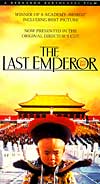 Large-scale,
Best Picture contenders included Warren Beatty's big-budget epic Reds (1981)
about radical American journalist John Reed (played by Beatty) during the Bolshevik Revolution
of 1917, and Bernard Bertolucci's engrossing and colorful The Last
Emperor (1987) with nine Academy Awards, about the life of the last
emperor of China - Pu Yi from childhood in the Forbidden City to his Emperor-ship
and then to his lowly status as a gardener in Mao's China. It was remarkable
that Bertolucci was allowed to film inside the Forbidden City. In the
same year, but without a Best Picture nod, Steven Spielberg's epic-scale
Asian-centered Empire of the Sun (1987), with six Academy Awards
nominations (and no wins), prefigured the director's later, even more
highly-acclaimed epic-war-related films in the next decade: Schindler's
List (1993) and Saving Private Ryan (1998). Large-scale,
Best Picture contenders included Warren Beatty's big-budget epic Reds (1981)
about radical American journalist John Reed (played by Beatty) during the Bolshevik Revolution
of 1917, and Bernard Bertolucci's engrossing and colorful The Last
Emperor (1987) with nine Academy Awards, about the life of the last
emperor of China - Pu Yi from childhood in the Forbidden City to his Emperor-ship
and then to his lowly status as a gardener in Mao's China. It was remarkable
that Bertolucci was allowed to film inside the Forbidden City. In the
same year, but without a Best Picture nod, Steven Spielberg's epic-scale
Asian-centered Empire of the Sun (1987), with six Academy Awards
nominations (and no wins), prefigured the director's later, even more
highly-acclaimed epic-war-related films in the next decade: Schindler's
List (1993) and Saving Private Ryan (1998).
Milos Forman's Amadeus (1984),
adapted from Peter Shaffer's play, was about the legendary (foul-mouthed
and silly) musical genius Wolfgang Amadeus Mozart (Tom Hulce) and
the plotting of his second-rate, intensely-jealous and bitter competitor
- court composer Antonio Salieri (F. Murray Abraham). Richard Attenborough's
major, epic-style British film - the screen biography of the Indian
spiritual and political leader Gandhi
(1982) was a major award winner due to Ben Kingsley's outstanding
performance in the lead role. Italian film director Sergio Leone's Once
Upon a Time in America (1984) was a monumental 220-minute mobster
saga, surveying the life of Jewish hood Noodles (Robert DeNiro) over
a period of three decades (from the 30s to the 60s), mostly told in
flashback.
 Writer/director
Philip Kaufman's epic screen tribute to the early years of the heroic US Mercury
astronaut space program (and the first seven astronauts in the 1960s space
program) The Right Stuff (1983) was a box-office failure, yet it
received eight Oscar nominations (and won four). It was based on Tom Wolfe's
best-selling book about the space race after the Russians launched Sputnik, highlighting the era of Chuck Yeager (Sam Shepard) breaking the sound barrier in the late 40s through the orbiting of the Earth in the early 60s by John Glenn (Ed Harris).
The old-style, sweeping epic of the 50s and 60s made a comeback in the
form of the grand-scale travelogue/romance Out of Africa (1985)
based on the life and works of Danish writer Isak Dinesen (Meryl Streep). Writer/director
Philip Kaufman's epic screen tribute to the early years of the heroic US Mercury
astronaut space program (and the first seven astronauts in the 1960s space
program) The Right Stuff (1983) was a box-office failure, yet it
received eight Oscar nominations (and won four). It was based on Tom Wolfe's
best-selling book about the space race after the Russians launched Sputnik, highlighting the era of Chuck Yeager (Sam Shepard) breaking the sound barrier in the late 40s through the orbiting of the Earth in the early 60s by John Glenn (Ed Harris).
The old-style, sweeping epic of the 50s and 60s made a comeback in the
form of the grand-scale travelogue/romance Out of Africa (1985)
based on the life and works of Danish writer Isak Dinesen (Meryl Streep).
War Films of the 80s:
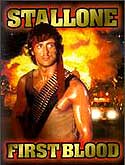 In
the Reagan era, Hollywood finally allowed Americans to come to terms with
the Vietnam War and its aftermath in a combination of films employing
a successful formula - a stoic, gung-ho action hero: Sylvester Stallone
starred in director George Cosmatos' Rambo: First Blood, Part II (1985)
- part of a series of pro-American, revisionist Vietnam films. In this
comic-strip-like action film, Stallone was showcased as a larger-than-life,
ex-Green Beret macho commando/hero John Rambo saving American MIA POWs
being held in Vietnamese prison camps. [The first film in the series was
First Blood (1982), about traumatized war veteran Rambo who went berserk and
became a killing machine using his guerrilla training after being mistreated and unfairly arrested
in a small town by the sheriff (Brian Dennehy). Two more sequels followed: director Peter MacDonald's Rambo III (1988), and then co-writer, director, and actor Stallone reprised the role many years later for Rambo (2008).] In
the Reagan era, Hollywood finally allowed Americans to come to terms with
the Vietnam War and its aftermath in a combination of films employing
a successful formula - a stoic, gung-ho action hero: Sylvester Stallone
starred in director George Cosmatos' Rambo: First Blood, Part II (1985)
- part of a series of pro-American, revisionist Vietnam films. In this
comic-strip-like action film, Stallone was showcased as a larger-than-life,
ex-Green Beret macho commando/hero John Rambo saving American MIA POWs
being held in Vietnamese prison camps. [The first film in the series was
First Blood (1982), about traumatized war veteran Rambo who went berserk and
became a killing machine using his guerrilla training after being mistreated and unfairly arrested
in a small town by the sheriff (Brian Dennehy). Two more sequels followed: director Peter MacDonald's Rambo III (1988), and then co-writer, director, and actor Stallone reprised the role many years later for Rambo (2008).]
After a series of martial arts films in the 70s, low-budget action hero
Chuck Norris appeared in a Rambo-inspired Missing in Action (1984)
as a Vietnam vet who returned to SE Asia to rescue more American POWs.
Actor/director Clint Eastwood's Heartbreak Ridge (1986) displayed
an aging ex-Vietnam gunnery sergeant as the leader of an inexperienced
US Marine Reconnaissance Platoon in Grenada.
Other films displayed more critical perspectives on war in general, on the Vietnam War,
and on other dramatic political upheavals in the world:
- director Peter Weir's historical anti-war film Gallipoli (1981, Aus.) told about the futile campaign of Anzac recruits (two sprinters Archy (Mark Lee) and Frank (Mel Gibson)) against the Turks in 1915 - ending with a haunting freeze-frame on the Anzac battlefield at Gallipoli
- Wolfgang Petersen's historically-accurate and claustrophobic Das Boot (1981, W. Germ), a terrifying war drama about a German U-boat in the North Atlantic during WWII; it became one of the most successful foreign-language films ever (with six Oscar nominations!)
- Costa-Gavras' Missing (1982) dealt with the
search for a missing journalist during Pinochet's rule in Chile in 1973
- Peter Weir's last Australian production The Year
of Living Dangerously (1982, Australia/US) presented a intriguing
picture of strife-ridden, pre-revolutionary Indonesia in 1965
just prior to Sukarno's fall
- Roger Spottiswoode's Under Fire (1983) portrayed
the chaotic, corrupt regime of Somoza in Nicaragua in 1979
- director Roland Joffe's The Killing Fields (1984) visualized the horrors of war (during Pol Pot's regime, especially in the scene of a muddy pit filled with bones) in a story of the friendship between NY Times reporter Sydney Schanberg (Sam Waterston) and his Cambodian aide Dith Pran (Haing S. Ngor) who became separated during the Khmer Rouge bloodbath
-
 Oliver Stone's Salvador (1986) criticized US
involvement in war-torn El Salvador in the early 80s Oliver Stone's Salvador (1986) criticized US
involvement in war-torn El Salvador in the early 80s
- writer/director Oliver Stone's first major film
(the first film in his so-called
'Vietnam Trilogy') was the realistic 'Nam film Platoon (1986) - about
a young recruit's (Charlie Sheen) plunge into the bloody, horrifying Vietnam combat
as the member of a divided platoon, personalized as a conflict between "bad" Sergeant Barnes (Tom Berenger) and "good" Sergeant Elias (Willem Dafoe); the film eventually grossed $138 million and won four Oscars (including Best Director and Best Picture), and easily lived up to its tagline: "The first casualty of war is innocence"
- Born on the Fourth of July (1989) presented
the screen biography of paralyzed, wheelchair-bound Vietnam vet and
anti-war activist hero Ron Kovic (Tom Cruise)
- Stanley Kubrick's first film after seven years was
the unforgettable and provocative picture Full Metal Jacket (1987)
- filmed on a set that re-created Vietnam in East London; uniquely,
it depicted urban rather than jungle combat in Vietnam
- the fact-based war epic Glory (1989), set in
an entirely different era and with an even-handed attitude toward the
issue of war, dramatized the combat heroics of the all-black
54th Regiment of the Massachusetts Volunteer Infantry in the bloody
Civil War
 Film History of the 1980s
Film History of the 1980s
Part 1, Part 2, Part 3, Part 4, Part 5, Part 6

 
|
